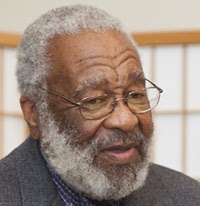Vincent Harding: Friend of Humankind
Humankind lost a true friend last week. A friend and adviser to Martin Luther King Jr., the historian, author, and activist Vincent Harding, who died at age 82, was a towering, irreplaceable figure in the fields of peace, justice, religious pluralism, and social transformation, fields within which I have done my work for the last two decades. I am extraordinarily blessed that Dr. Harding is among those I have worked with.
When talking about Dr. Harding with friends, I invariably say that he was a truly great man. Why? First, he brought with him the power of lived history, including the triumphs and the losses of the movement. It was Harding who drafted King's famous Vietnam speech, in which the civil rights leader took the then controversial stance to oppose that tragic war, the logic being that a commitment to nonviolence is, as Ken Butigan says, based on an "awareness of the oneness of all being." Further, commitment to the well being of the poor and dispossessed at home must acknowledge the horrible toll being taken on the poor villagers of Vietnam. To the end Dr. Harding wore a button that said "War Is Terrorism," which is correct.
When King was killed a year later, Dr. Harding couldn't help but wonder if the Vietnam speech had somehow encouraged, as he put it, the assassin's bullet to finally find his friend. He found peace with this when their mutual friend James Lawson assured Dr. Harding that Martin never did or said anything he didn't want to.
But his power came from more than this intimacy with history. It came from the way he never succumbed to bitterness, even after losses such as that of his friend Martin. It came from the way he wanted us to keep our "eyes on the prize" of true freedom and well being for all people, a goal which is ongoing, which includes but is not limited to the expansion of civil rights. He gently but forcefully urged and encouraged everyone he met to believe in themselves and their capacity to make a positive difference. He urged us to understand that, as Aime Cesaire put it, "the work of humankind has just begun." The task of truly being sisters and brothers to one another is just starting, as we now understand the benchmark of human rights, and as we now enter the era of undeniable globalization and interconnection.
His power came from the fact that, despite the racism with which he contended, and which all of us must contend, he always expressed his gratitude to have been born in the US, where, because of our unparallelled racial, ethnic, and cultural diversity, we face challenges greater than those of more homogeneous societies, but where we also have much greater potential. We can be an exemplar of the power that comes from creating the world's most complex multiracial democracy, a microcosm of what the world must become. Last August, I actually did a brief post on this topic. I quoted Vincent as saying:
"Let me say this with a slight bit of humor as well as something deeper: It's a way of testing the wisdom of God for making such a strange variety of beings, giving them the capacities that we have, and telling them to get together and figure out how to live together, how to love one another, how to share, and how to bless one another and bless this world. I think of this as a reflection on America's potential."Most moving was the gratitude he gave for his life and the love he says he was so blessed to have received. Just last fall I did a video interview with him (see above) in which he stated that because of the power and pervasiveness of the love he has received he felt confident that this love would follow him into whatever would come next, after death, if indeed there is a continuity of life or of energy. Speaking at the Quaker retreat Pendle Hill just days before he died, he said that he was "loved into life." He loved so many of us into life, and when he greeted us as "my brother" or "my sister," in the manner of the Christian peace movement, it felt really good to be included in the family of one such as him. Be well, brother Vincent. You did good work here.
:::
I haven't included much biographical information here, but there are plenty of good pieces available online now, including these.
Ken Butigan's tribute at the Waging Nonviolence website is really wonderful.
The New York Times obit focused on the Vietnam speech and related struggles.
At my work website, I created a page that provides a bunch of links to interviews and other things he did with our center. You'll see some of the same language there as I used here.
Click on "Vincent Harding" in Labels to see my other posts here featuring Dr. Harding.

Comments
Post a Comment